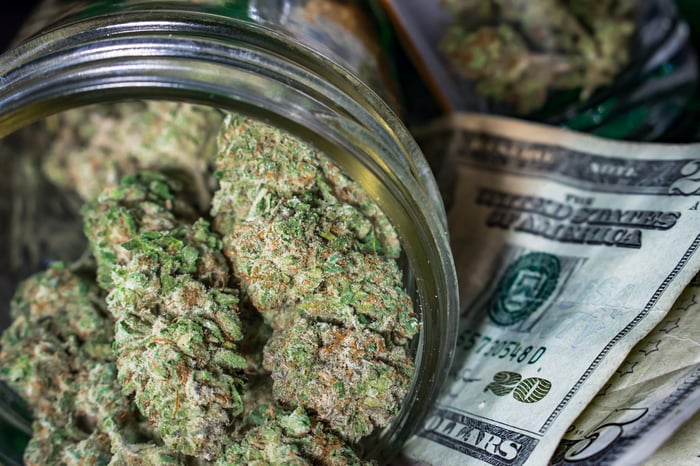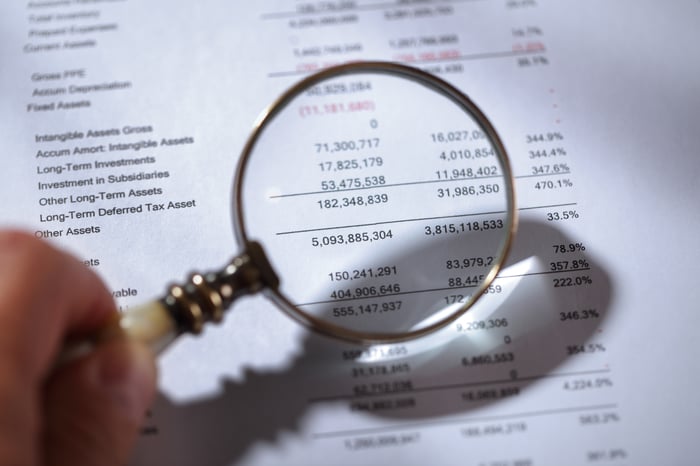After years of promises and months of debate, the wait is nearly over in Canada. In 22 days, on Oct. 17, recreational marijuana will go on sale in licensed dispensaries in our neighbor to the north to adults aged 18 or 19 and older (depending on the province). When legal, the expectation is that demand will be robust and growth will be off the charts, resulting in potentially billions of dollars in added annual revenue.
But as we investors know from following any industry, there will be winners and losers. As we creep closer to the all-important legalization date, one pot stock that's currently lugging around a nearly $1.8 billion valuation looks downright risky, despite the major role it's expected to play within the industry.

Image source: Getty Images.
This marijuana stock has seen plenty of green up to this point...
The Green Organic Dutchman (TGOD.F -23.08%) made waves earlier this year with one of the largest pot-based initial public offerings in history. What's made the company so intriguing to investors are its aggressive capacity expansion plans, its product diversity, and speculative dealmaking potential.
When The Green Organic Dutchman debuted, management cued in Wall Street to expect 116,000 kilograms of peak annual production. This included 102,000 kilograms a year from its Quebec project, and 14,000 kilograms once its Ontario project is complete. Then June hit, and TGOD, as the company is also known, made three capacity-changing announcements in a span of less than two weeks. A partnership with Jamaica's Epican Medicinals, announced plans to build a division devoted to beverages and edibles, and a partnership with Queen Genetics/Knud Jepsen in Denmark will boost peak production to an estimated 195,000 kilograms a year. That would make TGOD the No. 4 grower in Canada.
Secondly, but also building on the previous point, The Green Organic Dutchman is constructing a 287,245-square-foot facility that it'll devote to edibles and cannabis-infused beverages. Since we've witnessed numerous examples of dried cannabis becoming commoditized in Colorado, Washington, Oregon, and even California, product diversity will be pivotal. Not to mention, alternative cannabis products like beverages and edibles have less chance of facing pricing pressures, and should therefore generate more robust margins.
Lastly, there's been a lot of buzz about potential tie-ups between beverage, tobacco, and pharmaceutical companies and the cannabis industry. The thinking here being that with TGOD sporting 195,000 kilograms of eventual capacity, and devoting a little more than 20% of that capacity to edibles and beverages, it'll be a top target of brand-name beverage companies looking to make infused drinks.

Image source: Getty Images.
... But a sea of red could soon follow
Yet, what investors may not realize is that The Green Organic Dutchman carries an extraordinary amount of risk, arguably more so than your average pot stock.
It begins with TGOD's capacity expansion. According to the company, production isn't even expected to begin until sometime during the first half of 2019. Mind you, its peers aren't exactly flooding the market with marijuana themselves as of yet, but there are more than a handful of competitors on track to generate five- and six-digit kilogram yields over the next 12 months. Because TGOD is so late to the game in getting its production online and to market, there's a good chance it could miss out on lucrative long-term supply deals. In other words, it'll have to work that much harder to find a home for all of its cannabis.
Just as disconcerting is the possibility that the company could encounter production delays in its effort to bring cannabis to market by the first half of 2019. And given what we've witnessed in U.S. states that've legalized recreational weed, every month that TGOD misses with regard to production could mean a lower net realized per-gram price when it finally does bring its product to market.
Investors aren't going to want to overlook the potential for dilution, either. At the end of the company's second quarter in 2017, it had 121.4 million shares outstanding. Now, it has almost 234 million. The more shares that are outstanding, the more difficult it'll be for The Green Organic Dutchman to generate a meaningful per-share profit. To add, the company also ended its most recent quarter with just shy of 75 million warrants and a little over 14 million stock options outstanding. If/when these are executed, its outstanding share count could balloon even higher, weighing on investors and its per-share profitability.

Image source: Getty Images.
There's also no guarantee that TGOD will find a brand-name beverage, tobacco, or pharmaceutical partner. It certainly has the pedigree based on its expected production of 195,000 kilograms to attract a well-known company, but being so late to the game in getting its facilities online could make it less desirable to bigger companies looking for a cannabis partner.
Ultimately, this means investors are currently paying nearly $1.8 billion for a company without a cent in revenue that's going to be late to the party and will likely continue hurting shareholders with dilution. I have four words for that: Thanks, but no thanks!





